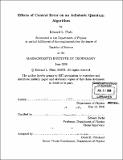Effects of control error on an adiabatic quantum algorithm
Author(s)
Platt, Edward L
DownloadFull printable version (1.869Mb)
Other Contributors
Massachusetts Institute of Technology. Dept. of Physics.
Advisor
Edward Farhi.
Terms of use
Metadata
Show full item recordAbstract
Noise in adiabatic quantum computation can be modelled as a perturbation of the problem Hamiltonian. For a type of noise called control error, the perturbation can be considered to have the same structure as the problem Hamiltonian. If the problem Hamiltonian, and therefore the noise, are 2-local, then the result of the adiabatic algorithm can be simulated somewhat more efficiently than an algorithm with an arbitrary problem Hamiltonain. Using optimized numerical methods, I present an analysis of the effect of 1-local and 2-local control error on the success of an adiabatic algorithm that solves the agree problem. Furthermore, I examine how the maximum allowable noise, or success threshold, scales with the number of qubits. These analyses suggest the existence of a minimum success threshold for the particular algorithm considered in the presence of only 2-local noise on an arbitrarily large number of qubits, as well as a polynomial decrease in success threshold with the number of qubits.
Description
Thesis (S.B.)--Massachusetts Institute of Technology, Dept. of Physics, 2006. Includes bibliographical references (p. 59-60).
Date issued
2006Department
Massachusetts Institute of Technology. Department of PhysicsPublisher
Massachusetts Institute of Technology
Keywords
Physics.